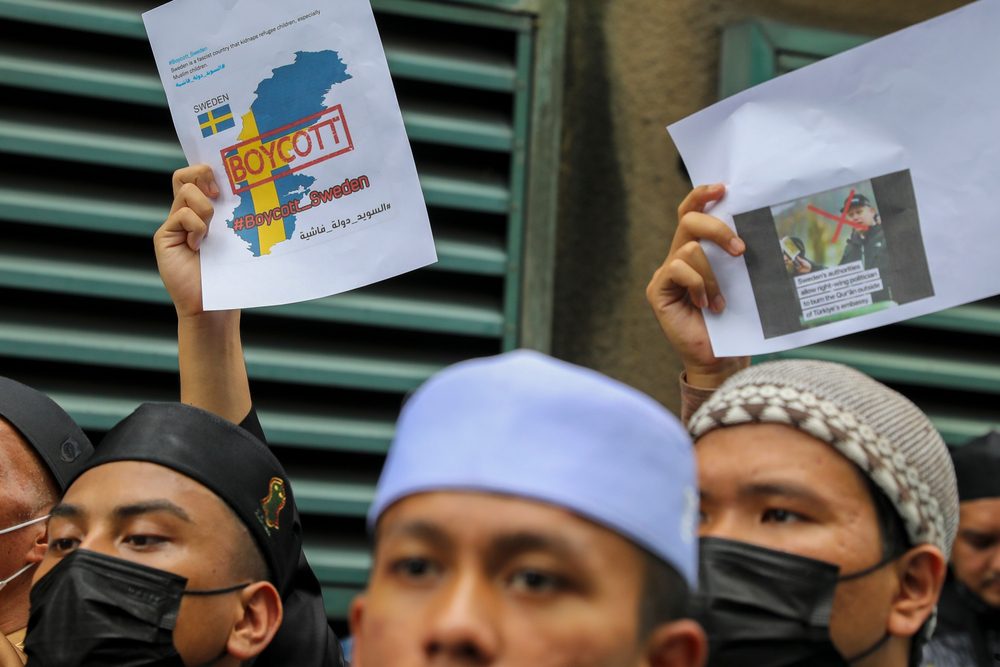
Protest outside the Swedish embassy in Kuala Lumpur, Malaysia, 27 January 2023, in response to the burning of a copy of the Quran near the Turkish Embassy in Stockholm.
Islamic extremists’ interest in Sweden is spiking, according to SÄPO, the Swedish Security Service. In a February 8th press release, the agency said its intelligence had shown a higher number of Islamic threats of an attack made to the country.
As causes for the trend, SÄPO cites—among others—the January 21st burning of the Quran by Danish-Swedish political activist Rasmus Paludan. Paludan performed the act outside the Turkish embassy in Stockholm during protests critical of Sweden joining NATO.
The Turkish Foreign Ministry was quick to condemn “in the strongest possible terms the vile attack on our holy book … Permitting this anti-Islam act, which targets Muslims and insults our sacred values, under the guise of freedom of expression is completely unacceptable,” he then said.
The debacle constituted a blow to the already fraught relationship between Sweden and Turkey, as the former was still attempting to secure Ankara’s approval for it to join NATO. Ankara felt that Sweden was falling short in its promise to crack down on what Ankara views as terrorist groups.
Following the burning, Turkish President Recep Tayyip Erdoğan said that Sweden should not count on Turkey’s support for obtaining NATO membership.
Soon, the situation moved well beyond Sweden and Turkey’s borders, as accusations of Islamophobia gained traction internationally. In Afghanistan, thousands took to protesting Rasmus Paludan’s actions, which had inflamed other parts of the Muslim world as well.
In the permit he had obtained from the police, Paludan stated the protest was anti-Islam in nature and served to condemn Erdoğan’s attempt to influence freedom of expression in Sweden.
Paludan, the leader of the Danish far-right political party Hard Line has Swedish citizenship, and is known to have held similar demonstrations in the past. He has vowed to continue burning Qurans in the public square until Turkey approves Sweden’s NATO application.
On Wednesday, February 8th, Swedish police refused to permit another such planned burning outside the Turkish embassy in Stockholm. Only, this time it was not Rasmus Paludan who had requested permission, but an unnamed “person representing a cultural association.”
This and other situations, such as the “disinformation campaign against the Swedish social services’ treatment of children,” (which were accused of kidnapping them) the Swedish Security Service notes, have a “threat-inducing effect.” Subsequently, the nation’s security situation was left “negatively impacted.”
Yet, while the agency describes the situation as “concerning,” with “violent Islamist circles globally” now “focusing more on Sweden,” no changes have been made to the already elevated terrorist threat level.
Should this development continue, the agency notes, the terrorist threat level could however yet be raised. It concluded that it would continue to cooperate “closely with both national and international partners in its work to protect national security, and assess the threat on an ongoing basis.”
“We live in an incredibly polarized world where a small spark can have major consequences,” Fredrik Hallström, head of counter-terrorism at SÄPO, told SVT Nyheter. While he did not want to go into detail about the exact nature of the threats made to Sweden, Hallström said that “when it comes to the threats, it is mainly the violence-promoting Islamist environment that is targeting us.”
Hallström went on to explain that Sweden’s threat level had been elevated “for some time” and that the risk of attack was already factored in that assessment.
